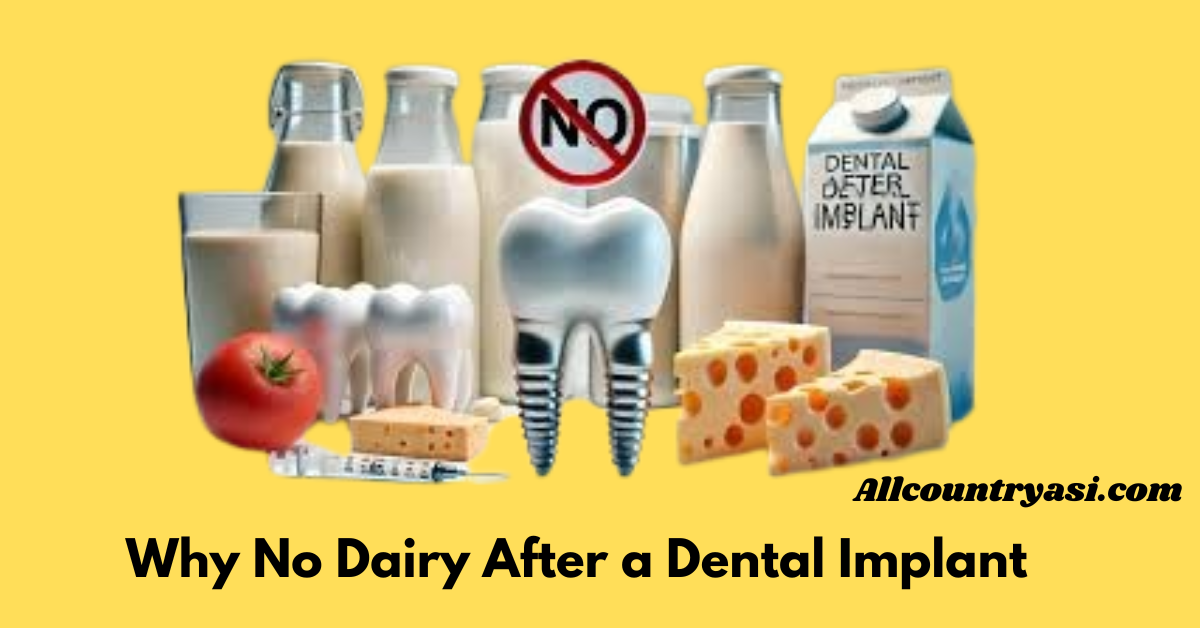Why No Dairy After a Dental Implant
Receiving a dental implant diary means caring for your teeth. It can alter the way you eat and smile. You must adhere to the expert recommendations of your dentist after you have had a dental implant. One common suggestion is to eliminate dairy for a while. This is more important; read below.

What is a dental implant?
A dental implant is an artificial tooth root. It is composed of three basic parts:
- Implant Post: This is what gets inserted into your jawbone. It functions as the root of a tooth.
- Abutment: This is the piece that connects the implant post to the crown.
- Crown: The part of the tooth visible above the gum line that is shaped as close to a natural, functional tooth and helps you chew.
Having a dental implant often requires surgery. You are required to take extra care of your mouth post-surgery.
Why is Dairy Restricted After a Dental Implant?
1. Healing Process
Your body requires time to recover immediately after surgery. Dairy products slow down this healing process. Here are some reasons why:
- Mucus Production: They have been objecting to the mucus forming, enabling digestion about (2–3 hrs instead of 5 hrs or more if I drink a glass on an empty stomach) mucus production: Dairy Products. This thicker mucus can build up in your throat and mouth. Sometimes it can feel tight and make keeping your mouth clean challenging.
- Inflammation: There is some evidence that dairy can cause inflammation in certain people. Inflammation can delay healing and increase recovery persistence.
2. Infection Risk
Infection is one of the more common problems that people have after they have had a dental implant. The whole cycle is as follows: dairy is implicated in this way:
- Bacteria Growth: Milk and other dairy products provide a warm, moist environment for mucosae to feast. In other words, this is the real bacteria infestation zone. This can cause infections due to the presence of bacteria that multiplies around this implant.
- Sticky Foods: Cheese is one sticky dairy product. Chewy and sticky types of foods may also become stuck in the slot where your implant is placed, making it more difficult to keep the area clean. This can also (officially) make infections more likely.
3. Digestive Issues
There are certain people who suffer from lactose intolerance. This means their bodies have difficulty processing dairy products. Your body cannot focus on healing if you eat something that causes it to be sick, and dairy most certainly does not heal the human. This is what you could find:
- Bloating: You will find yourself feeling very much out of place. The baby is 7 hours old, and you are in the hospital; possible belly pain from coming out, ouch.
- Gas and Cramping: While most of these symptoms are just unpleasant and can make eating the best post-op foods difficult,.
4. Nutritional Considerations
Dairy is a great source of calcium and protein, but not if it causes more harm than good. Here are some alternatives:
- Leafy Greens: These include things like spinach and kale, which are high in calcium. They are also full of vitamins.
- Fish: Fish (salmon) is a protein-rich source that can help you stay full, peaceful, and healthy.
- Nuts and Seeds: Another important point is it provides protein and fats from almonds and chia seeds, so no dairy here, which you know I am not a fan of.
What Can You Eat Instead?
It is of utmost importance to eat easy-to-eat and digesting food while not consuming dairy. On the other hand, here are some very good alternatives:
Soft Fruits
The well-known soft fruits. Soft, tasty, and very nutritious! Here are a few ideas:
- Applesauce: Any kind of veggie you can throw into a Ziploc bag is easily munchable, and some provide vitamins. It’s a fantastic snack or side dish.
- Mashed Bananas: Bananas: they are the softest on your percolate. Enjoy them on their own or throw a handful into your daily smoothie.
Smoothies
Studies have shown that milk may not be the healthiest option for everyone, so if you are having gastrointestinal problems with your dairy from time to time, these delicious smoothies will go right in line. How To Make The Perfect Smoothie
- Pick Your Base: Water / Coconut Milk / Almond Milk
- Integrate Plain Yogurt: It must be sugar-free, plain yogurt. Fruits and berries, bananas, or spinach for extra nutrients
- Include protein: this can be in the form of a scoop or two of 1st Phorm Protein Powder, nut butter, or seeds.
- Pulses to blend everything well. Enjoy!
Mashed Potatoes
Soft and creamy, they go down easily. You can make them tasty by:
- Adding Butter: A drop of a little bit of butter, just to bring them into a richer taste.
- Mixing in Garlic: For a little extra flavor, throw in some chopped garlic if you like.
Cooked Vegetables
Soft & Cooked Veggies are Nutritious Here are a few examples:
- Steamed Carrots: This product is soft and sweet; therefore, they are easy to chew.
- Mashed Sweet Potatoes: They are not only very sweet and sour but also chock full of vitamins.
Tips for After Surgery
How To Care For Yourself After Receiving A Dental Implant Here are some helpful tips:
Stay Hydrated
However, getting enough water down my gullet is their indirect implication in healing. Here are some tips:
- Drink Water Frequently: While you should be doing this already, try and make an effort to sip water all day long.
- Avoid Sugary Drinks: Do not consume sodas and sugary juices. This will promote the growth of bacteria.
Follow Your Dentist’s Instructions
And always heed your dentist. – They know what’s right for your growth. General rules include:
- Avoid Hard Foods: Hard foods can break the implant or insult your gums that need to go back.
- Do Not Smoke: Smoking may slow healing and increase the chance of infection.
Use a Salt Water Rinse
Warm saltwater mouth rinse.
- Reduce Swelling: Inflamed gums can benefit from rinsing with saltwater.
- Keep Your Mouth Clean: It scrubs away the meal particles without any tough substance.
Monitor Your Recovery
Since it is an outpatient procedure, you’d better notice well after the surgery. If you see something that is not normal, reach out to your dentist immediately. Here are signs to watch for:
- Increased Pain: A bit of discomfort is fine, but if you experience sudden, sharp pains, this could be a sign of infection.
- Swelling: If there is a little swelling that is normal to be expected, however, if the patient shows excessive signs of fluid buildup, check in with your doctor.
- Fever: If you have a fever over 100, which can indicate an infection…
FAQs About Avoiding Dairy After a Dental Implant
1. How long should I avoid dairy after my dental implant?
Ditch the dairy for a week, or however long your dentist tells you. This is the time that your mouth will, sorry to say, start closing back up properly.
2. Can I eat yogurt if I avoid other dairy?
And you should steer clear of yogurt, which often can cause mucus as well. Plenty of soft and healthy alternatives exist.
3. What if I love dairy and don’t want to give it up?
After you heal, this should not be an issue. This, however, takes time and careful body awareness.
4. Are there any dairy alternatives I can use?
Yes, you can also make smoothies with almond milk, coconut milk, or soy milk. Meals, simple sugars, keto, and low-carb products Packaged Seafood + Fish Shellfish Bread, Muffin Varieties.
5. What should I do if I accidentally eat dairy?
Even if you have an accident and dairy enters a foodstuff, people can say, Let’s see how that makes us feel. In that case, you should immediately notify your dentist, who will guide you.
6. What other foods should I avoid after my implant?
Do not chew hard, crunchy, or sticky food. These will damage the area where the implant is placed and slow down recovery.
7. Can I drink coffee or tea?
So, yes, assuming you don’t include milk or cream. Go for black coffee or herbal teas. SaveChangesAsync
8. What should I do if I have questions about my diet after surgery?
You should always feel comfortable contacting your dentist. Each can offer you personally tailored advice.
Conclusion
A dental implant procedure has multiple reasons why you want to avoid dairy altogether. It will prevent infection, help you heal, and keep your mouth clean. You can help, but give your body the basic foods it needs to heal by selecting soft and healthy options. Just drink lots of water and follow your dentist’s advice. Take care, guys. Your smile will thank you.

1 thought on “Why No Dairy After a Dental Implant (2024)”